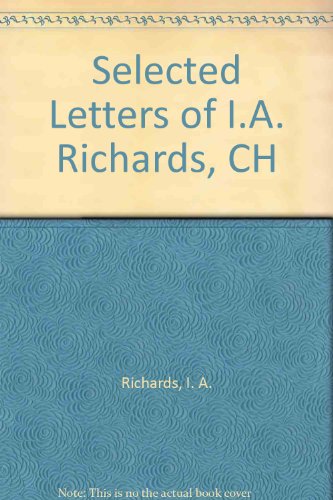Background
On February 26, 1893, Ivor Armstrong Richards was born at Cheshire.



(This illuminating collection documents the life and frien...)
This illuminating collection documents the life and friendships of one of the century's most influential philosophers of language and aesthetics. Following Richards's career from his first undergraduate days at Magdalene College in 1911, to the end of his life at Cambridge, the letters describe his epoch-making lectures and books of the twenties and thirties, his years of campaigning in the Far East on behalf of Basic English, and his life as Chair at Harvard, in which he speaks of Eliot, Wittgenstein, Chairman Mao, and Robert Lowell, among others.
http://www.amazon.com/gp/product/0198186029/?tag=2022091-20
educator literary critic rhetorician
On February 26, 1893, Ivor Armstrong Richards was born at Cheshire.
He was educated at Clifton College in Bristol and Magdalen College in Cambridge.
In 1922 he became a lecturer in English and moral science at Cambridge and four years later was made a fellow of Magdalen.
With Ogden he collaborated on The Meaning of Meaning (1923), a pioneer study in semantics, in which they established that what is known as "meaning" resides in the recipient as well as in the originator of the thought.
Richards's first independent book, Principles of Literary Criticism (1924), was revolutionary in the development of modern criticism. Deriding "bogus" esthetic terms, like "beauty" which has no "entity, " Richards held that all value judgments reside in the communicant, not in the object or poem itself or in the communicator or poet. His principles of judgment are developed from this position.
Science and Poetry (1925) treats, in terms of vocabulary, experiences that he terms "critical" and "technical. "
In 1929 Richards published Practical Criticism, a report on the sad results of testing value judgments by presenting a class with specimens of writing whose authorship was not revealed.
In 1929-1930 Richards was visiting professor at Tsing Hua University, Peking. He was a lecturer and later a professor at Harvard, retiring in 1963. During the 1936 he wrote Mencius on the Mind (1932) and Coleridge on Imagination (1935), careful examinations of the systems of these protean thinkers. He also completed Interpretation in Teaching and How to Read a Page (both 1934).
Richards joined his former collaborator C. K. Ogden in a crusade for the use of "Basic" English, which consisted of the 850 words most commonly used in the English vocabulary. To elaborate on his theories, Richards wrote three tracts: Basic English and Its Uses (1943), Nations and Peace (1943), and So Much Nearer (1968). His translations into "Basic" included The Republic of Plato (1942), Tomorrow Morning, Faustus! (1962), and Why So, Socrates? (1963). Two volumes of verse, Good Bye, Earth (1958) and The Screens (1960), won him the Loines Poetry Award in 1962.
Richards' intellectual contributions to the establishment of the literary methodology of the New Criticism are presented in the books The Meaning of Meaning: A Study of the Influence of Language upon Thought and of the Science of Symbolism (1923), by C. K. Ogden and I. A. Richards, Principles of Literary Criticism (1926), Practical Criticism (1929), and The Philosophy of Rhetoric (1936).
(This illuminating collection documents the life and frien...)
(International Library Of Psychology, Philosophy, And Scie...)
(Brand new copy, never been used)
In 1926 he married Dorothy Eleanor Pilley.
